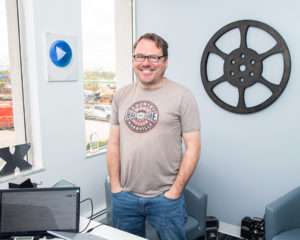[vc_row][vc_column][vc_column_text]Why is it that most people will speak of their first car fondly and with incredible nostalgia, even if it was a huge piece of junk? If anyone asks me if I remember my first car, I begin talking with great enthusiasm about my 1982 Buick Skylark. I consider myself very fortunate to have been able to drive that car, as it wasn’t that old in 1991 when I got it. My parents had the Buick as an extra car, and as long as I behaved myself, only drove it to school, work, and back home (at a reasonable hour), it was all mine. One day after school, another high school student hit me from behind and totaled the car. I needed that car! I had just landed an after-school internship at WNIR radio in Kent, Ohio, writing the traffic reports for the afternoon drive. Thankfully, as an early graduation gift, my parents helped me get a 1990 Chevy Cavalier. I loved this car. I drove it all over the country between age 17 and age 20. By 1994, it had 125,000 miles on it and a long list of problems. So I did what any responsible 20-something would do.
On impulse and under the excitement surrounding GM’s new Saturn brand, I bought a black Saturn SC coupe. This car was sweet. Pop-up headlights, moonroof, 5-speed, six disc CD changer with remote, power windows and locks, spoiler and everything. Niiiiiice.
The problem is that, like the Cavalier, the Saturn had problems, too. This car cost a lot of money! And, unlike my old Cavalier, the Saturn was in *my* name so adding to the growing list of problems was that the insurance was through the (moon)roof! In fact, the insurance cost more than the car. The monthly car payment was $237.50 to Bank One and the monthly insurance premium was $240.00 to Progressive. (I had five speeding tickets.) After about two years (one of which I drove without insurance – shh!), I realized I needed to get a car that was less expensive to own and insure.
So I bought a used Chevy Corsica. What a mistake. Talk about thowing good money after bad! Everything GM had learned about building an unreliable Skylark, an unreliable Cavalier, and an unreliable Saturn SC they put into creating an incredibly unreliable Corsica. I should have just kept the Saturn because at least it was fun to drive. And the plastic body panels would never rust!
This problem needed to be solved. I was well on my way to building a career as a freelance videographer in Akron and Cleveland, and I had to have a good car. Being in the video production business requires, at the very least, that you have reliable transportation. It was New Year’s Eve in 1997 when I walked in to Rick Case Honda at Chapel Hill Mall and traded in the Corsica for a black 1998 Honda Civic EX coupe. I had no idea at the time what an incredible choice I had made. I had no idea that I had just solved the car problem for the rest of my life through owning a Honda. I drove that Civic to 100,000 miles without a single problem. Three years later I sold it for more than what I owed and bought another Honda. The car held its value and then some. I was hooked.
For a moment, I felt guilty for buying a foreign car, but I don’t think for one second that I am responsible for the collapse of GM, or the downfall of the American auto industry. I believe that GM’s problems were caused by hundreds of thousands of people buying Hondas because they are good cars, and by the overwhelming financial burden of GM’s legacy promise to pay lifetime pension and medical benefits to retirees and spouses. Honda didn’t have these legacy costs since they didn’t start manufacturing in the US until 1982. Certainly, when GM committed to paying these lifetime benefits in the 1960s and 1970s, they couldn’t imagine the flood of imports that would dominate the market in the 1990s, along with the extended lifespan of the retirees who would be collecting these payments. Of course, this generation deserved the benefits they were promised, but there were just too many of them, and they were living too long (God bless ‘em!). For GM, it turned into a downward spiral of cost-cutting leading to lower product quality leading to customers getting burned leading to lower market share as consumers bought other products.
I am obsessed with how this happened. I am obsessed with General Motors, and specifically, the overwhelming problem of rebuilding an image, a brand, and a company, when absolutely everything is going wrong. I would have loved to have been a fly on the wall in the GM boardroom as these decisions were made. For me, as a sales and marketing professional, the most fascinating challenge is how to win back a customer when they have been disappointed, burned, or have an otherwise negative opinion of your brand or company. Now that I am a huge Honda fan, how could GM win back my business? I do lots of work in the automotive industry. I follow the trends, the manufacturers and the products. I go to the auto show. GM has emerged from bankruptcy as a stronger, leaner company and may now be offering the best cars and trucks they have ever made. How do they win people back? How does a buyer that once owned a Cavalier and a Corsica who can now afford to buy a Cadillac even consider one when they are looking at Acuras and BMWs?
Brand loyalty. Whether it is working for you or against you, it is a powerful thing. This is certainly true in the video production business. No matter what, we cannot cut corners. We cannot make money by cutting costs. If any attempt to increase profits or financial performance creates even the slightest threat to the quality of your product or service, it is not worth doing. The damage to your brand or reputation will cost you far more that any short-term gain. Everyday we operate, I realize that if we do anything to disappoint a client, that client is gone forever. If we don’t live up to a client’s high expectations we not only risk losing that customer and that business but we also risk damaging our brand. I know that once you have a good customer, you must do whatever it takes to keep him. If you lose him, it may take a lifetime to bring him back.[/vc_column_text][/vc_column][/vc_row]


